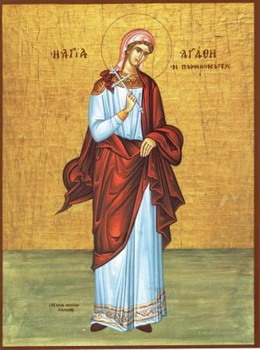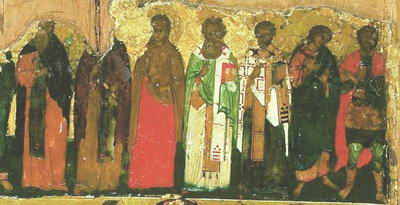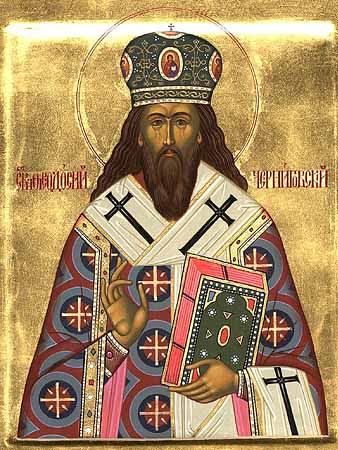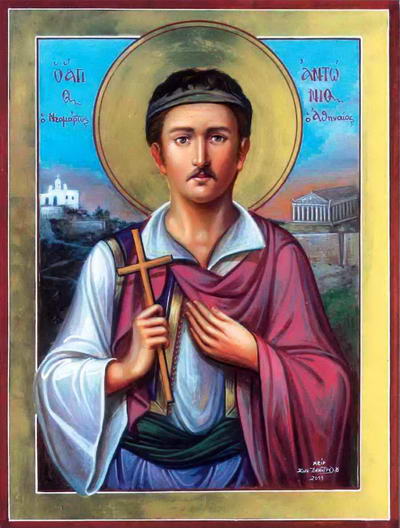|
|
Meatfare Saturday, Memorial Suturday Meatfare Saturday is one of several Memorial Saturdays, or Saturdays of the Departed, dedicated to remembrance of the dead in the liturgical year. Meatfare Saturday is one of several Memorial Saturdays, or Saturdays of the Departed, dedicated to remembrance of the dead in the liturgical year.The Holy Martyr Agatha This glorious virgin and martyr for Christ was born in the Sicilian town of Palermo of noble and prosperous parents. When the Emperor Decius launched a persecution of Christians, St Agatha was arrested and brought to judgement before Quintian the judge. He saw Agatha"s beauty and desired her for his wife. When he suggested this to her, she replied that she was the bride of Christ and could not be faithless to her Betrothed. The judge condemned her to cruel torture: Agatha was flogged, mocked, bound to a tree and beaten till the blood flowed. After that, the judge again urged her to deny Christ and so escape further torture, to which Christ"s bride replied: "These tortures are of great help to me. As wheat cannot come to the granary until it is cleansed of its chaff, so my soul cannot enter Paradise unless my body has first been broken by torture." Then the torturer ordered that her breasts be cut off and then she be thrown into prison. The holy Apostle Peter appeared to her in the prison and restored her to physical wholeness and health. She was once again taken out for torture and again cast back into prison, where she gave her soul to God in the town of Catania in the year 25After her death, her torturer Quintian set out to appropriate her lands, but on the way the horses became maddened under him and his soldiers. They were savaged on the face, thrown onto the ground and trampled to death. Thus God"s punishment came swiftly upon him for his ferocious crime against St Agatha. This glorious virgin and martyr for Christ was born in the Sicilian town of Palermo of noble and prosperous parents. When the Emperor Decius launched a persecution of Christians, St Agatha was arrested and brought to judgement before Quintian the judge. He saw Agatha"s beauty and desired her for his wife. When he suggested this to her, she replied that she was the bride of Christ and could not be faithless to her Betrothed. The judge condemned her to cruel torture: Agatha was flogged, mocked, bound to a tree and beaten till the blood flowed. After that, the judge again urged her to deny Christ and so escape further torture, to which Christ"s bride replied: "These tortures are of great help to me. As wheat cannot come to the granary until it is cleansed of its chaff, so my soul cannot enter Paradise unless my body has first been broken by torture." Then the torturer ordered that her breasts be cut off and then she be thrown into prison. The holy Apostle Peter appeared to her in the prison and restored her to physical wholeness and health. She was once again taken out for torture and again cast back into prison, where she gave her soul to God in the town of Catania in the year 25After her death, her torturer Quintian set out to appropriate her lands, but on the way the horses became maddened under him and his soldiers. They were savaged on the face, thrown onto the ground and trampled to death. Thus God"s punishment came swiftly upon him for his ferocious crime against St Agatha.The Holy Martyr Theodula She suffered for Christ in the time of Diocletian, the impious Roman Emperor. During her tortures, Theodula brought one of her torturers, Helladius, to his senses and to the Christian faith. When Helladius openly confessed his faith in Christ, he was beheaded. Theodula showed great courage at her trial, for which the judge considered her witless. To this, she retorted: "It is you who are witless, for you forget the one true God and bow down to lifeless stones." The judge put her to cruel torture, which Theodula endured with heroism, making her torturers marvel and bringing them to Christ. Among these were two eminent citizens, Macarius and Evagrius. With these two and many others, Theodula was thrown into a red-hot furnace, where they all finished this life with honour and were made worthy of the Kingdom of Christ. She suffered for Christ in the time of Diocletian, the impious Roman Emperor. During her tortures, Theodula brought one of her torturers, Helladius, to his senses and to the Christian faith. When Helladius openly confessed his faith in Christ, he was beheaded. Theodula showed great courage at her trial, for which the judge considered her witless. To this, she retorted: "It is you who are witless, for you forget the one true God and bow down to lifeless stones." The judge put her to cruel torture, which Theodula endured with heroism, making her torturers marvel and bringing them to Christ. Among these were two eminent citizens, Macarius and Evagrius. With these two and many others, Theodula was thrown into a red-hot furnace, where they all finished this life with honour and were made worthy of the Kingdom of Christ.St Polyeuctus, Patriarch of ConstantinopleFor his great mind, his zeal for the Faith and his power of oratory, he was called a second Chrysostom. The Russian Princess Olga came to Constantinople in the time of Patriarch Polyeuctus and the Emperor Constantine Porphyrogenitus, and was baptised there in 957. The Patriarch baptised her, and the Emperor stood godfather. St Polyeuctus prophesied: "Blessed art thou among Russian women, for thou hast desired the light and cast away darkness; the sons of Russia will bless thee to the last generation." From being a simple monk, Polyeuctus was raised to the Patriarchate in 946, and remained on the patriarchal throne until his death in 970.
Repose of St Theodosius of Chernigov Saint Theodosius, Archbishop of Chernigov, was born in the seventeenth century at the beginning of the decade of the thirties in Podolsk governance. He was descended from a noble family, the Polonitsky-Uglitskys. His parents were the priest Nikita and Maria. The saint was taught Christian piety in his parents’ home, and this piety remained with him throughout his life.
From childhood he was distinguished by a fervent love for God and zeal for the Church. The innate abilities of the youth came to light in the Kiev Brotherhood school at Kiev’s Theophany monastery. The school was flourishing at the end of the 1640s, when its rectors were Archimandrite Innocent (Gizel), and Igumen Lazar (Baranovich), who later became Archbishop of Chernigov. Among its instructors were: Hieromonk Epiphanius (Slavinetsky), Hieromonk Arsenius (Satanovsky), Bishop Theodosius (Baevsky) of Belorus, Igumen Theodosius (Saphonovich) and Meletius Dzik. These were the enlightened men of those days. The comrades of St Theodosius at the school would become future outstanding pastors: Simeon Polotsky, Joannicius Golyatovsky, Anthony Radivillovsky, Barlaam Yasninsky. The Kiev Brotherhood Theophany school was the chief center in the struggle of Orthodoxy against the assaults of Catholic clergy, particularly the Jesuits. Saint Theodosius, Archbishop of Chernigov, was born in the seventeenth century at the beginning of the decade of the thirties in Podolsk governance. He was descended from a noble family, the Polonitsky-Uglitskys. His parents were the priest Nikita and Maria. The saint was taught Christian piety in his parents’ home, and this piety remained with him throughout his life.
From childhood he was distinguished by a fervent love for God and zeal for the Church. The innate abilities of the youth came to light in the Kiev Brotherhood school at Kiev’s Theophany monastery. The school was flourishing at the end of the 1640s, when its rectors were Archimandrite Innocent (Gizel), and Igumen Lazar (Baranovich), who later became Archbishop of Chernigov. Among its instructors were: Hieromonk Epiphanius (Slavinetsky), Hieromonk Arsenius (Satanovsky), Bishop Theodosius (Baevsky) of Belorus, Igumen Theodosius (Saphonovich) and Meletius Dzik. These were the enlightened men of those days. The comrades of St Theodosius at the school would become future outstanding pastors: Simeon Polotsky, Joannicius Golyatovsky, Anthony Radivillovsky, Barlaam Yasninsky. The Kiev Brotherhood Theophany school was the chief center in the struggle of Orthodoxy against the assaults of Catholic clergy, particularly the Jesuits.New Martyr Anthony of Athens (1774) Saint Antony was the son of poor Christians from Athens. In order to help his parents, he entered the service of an Albanian Muslim at the age of twelve. In 1770, during the repression which followed the Greek rising in the Peloponnese, his masters sold him to some Turks, who tried in vain to convert him. He was then sold to a succession of five harsh, fanatical masters, but he remained unshaken in the Faith, and was bought at last by a Christian coppersmith in Constantinople. Having been warned one night in a dream that he would receive God's help to obtain the glory of martyrdom, he was recognized next day in the street by one of his former masters, who began shouting to the passers-by that the young Christian was his runaway slave and an apostate from Islam. Antony was dragged to the court amid much commotion. He confessed that he was willing to die a thousand deaths for the love of Christ. "You would become a Christian more easily than you could make me deny my Christ," he told the judge. Unable to persuade the Saint to feign conversion in order to save his life and under pressure from false witnesses, the judge reluctantly committed him to prison. Antony consoled the other Christian prisoners, gave away what little money he had to the poor, and wrote to thank his master for all his kindnesses and through him asked the forgiveness of all Christians and besought the prayers of the Church. Saint Antony was the son of poor Christians from Athens. In order to help his parents, he entered the service of an Albanian Muslim at the age of twelve. In 1770, during the repression which followed the Greek rising in the Peloponnese, his masters sold him to some Turks, who tried in vain to convert him. He was then sold to a succession of five harsh, fanatical masters, but he remained unshaken in the Faith, and was bought at last by a Christian coppersmith in Constantinople. Having been warned one night in a dream that he would receive God's help to obtain the glory of martyrdom, he was recognized next day in the street by one of his former masters, who began shouting to the passers-by that the young Christian was his runaway slave and an apostate from Islam. Antony was dragged to the court amid much commotion. He confessed that he was willing to die a thousand deaths for the love of Christ. "You would become a Christian more easily than you could make me deny my Christ," he told the judge. Unable to persuade the Saint to feign conversion in order to save his life and under pressure from false witnesses, the judge reluctantly committed him to prison. Antony consoled the other Christian prisoners, gave away what little money he had to the poor, and wrote to thank his master for all his kindnesses and through him asked the forgiveness of all Christians and besought the prayers of the Church.Martyr Helladius in CiliciaSaint Helladius witnessed the torture of St Theodula of Anazarbus in Asia Minor. Wishing to ingratiate himself with the governor and to receive honors, he asked the governor Pelagius to turn St Theodula over to him, promising to make her worship the pagan gods. .
Helladius subjected St Theodula to harsh torments, exceeding Pelagius in cruelty. The saint prayed that God would grant her the ability to persevere. She immediately received help from God and she was healed. The tormentor was awestruck, and St Theodula admonished him. “Become a Christian,” she said, “and attain eternal honors in the Kingdom of our Lord Jesus Christ, Who shall judge both the living and the dead and render to each man according to his deeds.”
By her prayers and her words, St Theodula led Helladius to the knowledge of truth. He believed in Christ and confessed the True God before the governor. He also received the crown of martyrdom. He was beheaded with a sword, and his body was thrown into the sea. He suffered for Christ during the reign of the Roman emperors Diocletian (284-305) and Maximian (305-311).
Martyr Evagrius and Macarius in CiliciaSaint Evagrius lived in the city of Anazarbus (Asia Minor) during the reign of the Roman emperors Diocletian (284-305) and Maximian (305-311). The prefect of the city, Pelagius, was a very cruel man. His servants sought out Christians throughout the entire region and brought them to trial, where which the imperial edict was read to them, and they were ordered to worship idols.
After seeing the miracles which took place as St Theodula was being tortured, many people believed in Christ, among whom were the respected citizens Macarius and Evagrius. The pagans continued to torture Christians. They heated an oven and threw St Theodula, Macarius, Evagrius and many other Christians into it. They all suffered martyrdom, and were translated into life immortal.
Saint Macarius came to believe in Christ after witnessing the martyrdom of St Theodula of Anazarbus. He was thrown into a heated oven, together with other Christians, and received the crown of martyrdom.
|